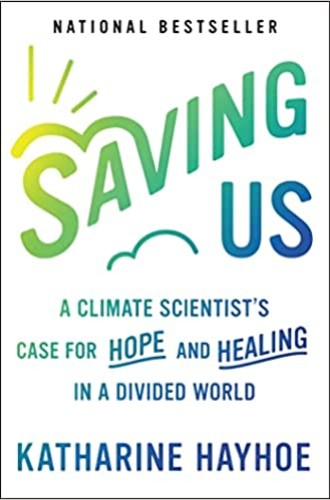We need to talk about climate change
Scientist Katharine Hayhoe recommends focusing on common ground and hope.
For Christian climate scientist Katharine Hayhoe, the most important thing we can do to address climate change is to talk about it. In Saving Us, Hayhoe lays out some strategies for doing just that—while also reminding us why it matters.
When I initially picked up this book, I was skeptical that talking about climate change could have a real impact. After so many climate summits that have failed to bring about the needed results, talk seems especially cheap. But this is precisely the attitude that Hayhoe sets out to resist. Just as the problem of climate change has many layers, from the decisions of large fossil fuel companies to our personal consumer habits, the solution is also multifaceted, with a need to take root within corporate boardrooms and city council meetings as well as our own homes. Talking is where change begins, Hayhoe insists. This is especially important because, according to recent polls she cites, a quarter of US Americans still do not see climate change as a serious concern.
Read our latest issue or browse back issues.
No one can deny the importance of facts. “We all know that if someone says, ‘gravity isn’t real’ and steps off a cliff, they’re going down whether they ‘believe’ in it or not,” Hayhoe states. But unfortunately, we are less responsive to facts that touch upon our identity, ideology, and morality—especially if they call upon us to change our behavior and way of life in ways we’d rather not. In discussing the large number of highly educated, scientifically literate people who deny that climate change is caused by humans, Hayhoe introduces the idea of motivated reasoning:
When we want to believe something. . . we ask ourselves “Can I believe it?” and we search for supporting evidence. When we don’t want to believe something, we ask “Must I believe it?” and we search for contrary evidence. We all engage in this type of motivated reasoning when our identity is on the line, even when the stakes are relatively low.
Hayhoe debunks the many “zombie arguments” that those who dismiss human-caused climate change prefer to turn to: that the changes we see are due to orbital cycles or variations in the sun’s brightness, that volcanic eruptions produce more carbon pollution than we do. She reminds us that, since the 1850s, scientists have known that our carbon emissions trap heat. However, as self-evident as facts may be, many people are resistant to hearing them. They fear government overreach that may force them to stop flying in planes or using a wood-burning stove; they also become resistant to any messages that hint of guilt and shame. No one wants to be told that they are a bad person, and such messaging tends to cement people more firmly in the views they already hold.
As an alternative, Hayhoe suggests that discussions of climate change should begin by looking for points of commonality. She describes a time when she was invited to speak to a group of conservative business leaders at the Rotary Club near Lubbock, Texas, where she lives. When she walked into the gathering, she noticed a banner that announced a “four-way test” and then the club’s guiding principles. To assess the value of discourse or action, Rotarians ask, “Is it true? Is it fair? Will it build goodwill and better friendship? Is it beneficial to all concerned?”
Hayhoe immediately reorganized her talk around this four-way test in order to demonstrate climate change’s truth; its inherent unfairness, particularly to the world’s poorest; and the shared benefits that will come from addressing it. Doing this, she found that listeners uncrossed their arms, leaned forward, and started nodding. After the talk, a local businessman said that he’d never given climate change much thought until she made him consider it in light of his Rotarian values.
In a similar way, Hayhoe argues that all of us can discuss climate change by focusing on what we collectively hold dear. We can begin with the local challenges facing the places where we live, our concerns for our children’s futures, or what we love doing—whether that’s hiking, hunting, snowmobiling, or enjoying good food and drink, all of which are threatened as the world warms. She urges us to quote surprising sources, such as business leaders (like the CEO of Unilever, who says all companies should be aiming for net-zero emissions) or military leaders (like Admiral Samuel Locklear, who sees climate change as a national security threat).
Throughout the book, Hayhoe adds a suggestion not frequently foregrounded in the environmental movement’s discourse: to bring faith into the conversation. She insists that concern for the earth is essential to a Christian worldview:
If Christians truly believe we’ve been given the responsibility—“dominion”—over every living thing on this planet, as it says at the very beginning of Genesis, then we won’t only objectively care about climate change. We will be at the front of the line demanding action because it’s our God-given responsibility to do so. Failing to care about climate change is a failure to love. What is more Christian than to be good stewards of the planet and love our global neighbor as ourselves?
To hear a climate scientist invoking faith is just as refreshing as it has been to hear faith leaders such as Pope Francis urging us to act to address climate change.
Hayhoe’s Christian commitment differentiates her from other environmental advocates in several ways. Certain elements of the environmental movement can come across as antihuman, such as the activists who assert that limiting population growth is the only option. Hayhoe, in contrast, responds that the focus should be placed on educating and empowering women worldwide (which does correlate with having fewer children) and reducing consumption in the wealthiest countries (where population growth is lower but carbon emissions are much higher). “It’s not about giving women fewer choices; it’s giving them more,” she writes. “The approach of enforcing control also ignores the fact that global resources are not used in a manner that is either equal or fair.”
Similarly, while Hayhoe does not at all sugarcoat the dire situation we are in, she takes a Christian approach in urging us to focus on hope rather than despair. Rather than allowing fear to paralyze us, we are called to act, individually and collectively, to make changes to our own consumption habits, and to urge our political leaders to enact better policies. By finding like-minded people, we gain support and can make a difference as a community. By the end of the book, I was persuaded by its argument that conversation is where it starts—and I was grateful that Hayhoe equips us to have those conversations.
* * * * *
Jon Mathieu, Christian Century's community engagement editor, speaks with Jeannine Marie Pitas about her review of Saving Us and what she learned from reading the book.






